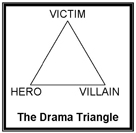In advance of the Fortune Fall Growth Summit, Gazelles coaches gather to sharpen our plowshares [so to speak] and learn new best practices and ideas from the thought leaders. Today included a new tool from Verne Harnish to help identify the 4-9 critical processes that drive a success as well as Verne’s new concept on Strategy. He specifically provided a best practice example from one of our Gazelles clients, Build Direct, that’s applying the Seven Strata of Strategy with great success. More on these in future blogs and newsletters.
Do you often complain about things? Do you know someone who does? How long have you been listening to someone complain. Is it frequently the same refrain about why they can’t do something, or get something done? If so you know a victim and you’ve probably been caught in the drama triangle.  Mo Fathelbab a guest presenter from Forum Resources Network, chose to complain to someone in the audience about the brownie’s and cookies served as snacks at speaking engagements he makes. Why don’t they serve healthy snacks he asked? The listener quickly asked Mo if he was being a victim? His point was how easily it is for us to get into this mode.
Mo Fathelbab a guest presenter from Forum Resources Network, chose to complain to someone in the audience about the brownie’s and cookies served as snacks at speaking engagements he makes. Why don’t they serve healthy snacks he asked? The listener quickly asked Mo if he was being a victim? His point was how easily it is for us to get into this mode.
Of course there’s a better way to handle things than choosing to be a victim as well as there are methods to approach those around you who act like victims. If you know a victim [someone in our audience indicated they know someone who’d been complaining for 40 years.] chances are you are either the hero or the villain in the story they are telling. You either swoop in to try and rescue them or judge them and thus end up enabling the victim.
To get out of the loop you need to either choose to be a creator [if you are in the victim role] or if you’re the recipient of the victim’s role you need to become the coach or challenger. A coach asks questions, continually probing to help the victim become a creator. They build confidence, placing the monkey back on the victim to help them make the shift to become creator and assume responsibility for their situation. The challenger gets the victim to recognize they are better than this; they expect more from them and know they can do it. Again the insistence is to make the victim feel like they are a creator and part of the solution. The victim remains a victim if they continue to focus on the problem.
One of our Gazelles coaches mentioned he was trying to understand how his four brothers and he were so successful. Why had they grown up so well and what had their father and mother done to help them achieve? He wanted desperately to know this since he had children of his own now and wanted to make sure they grew up and were successful.
The exercise on the drama triangle and the empowerment dynamic illustrated to him how his parents had helped them. They had removed the victim focus and coached and challenged them to succeed.
The book The Empowerment Dynamic by Daniel Emerald is a good primer on this. If you find your family members or more importantly your staff is constantly acting like a victim, recognize how by judging or enabling them [assume the role of hero or villain] you are continually getting stuck in the drama triangle with them. Move to empowerment and you can make progress.
What do you do to someone who continually focuses on the problem and refuses to release being a victim? In work the answer is “NEXT!” or as we used to say in radio, release them to the marketplace.
Today starts the Growth Summit with several headliners including David Sokol, Chip Heath and Liz Wiseman along with Verne Harnish on the schedule. I’ll have an update on their insights by tomorrow morning.






.jpeg?width=150&height=135&name=Hand%20with%20marker%20writing%20the%20question%20Whats%20Next_%20(1).jpeg)

